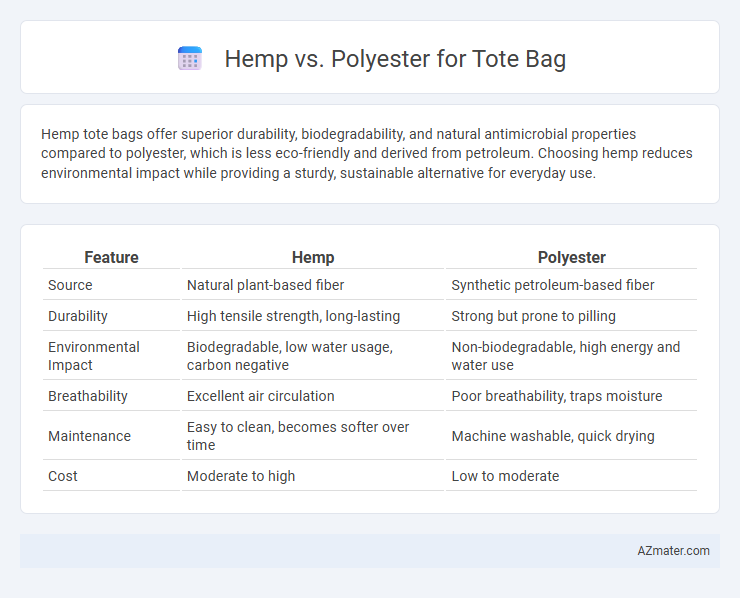Hemp tote bags offer superior durability, biodegradability, and natural antimicrobial properties compared to polyester, which is less eco-friendly and derived from petroleum. Choosing hemp reduces environmental impact while providing a sturdy, sustainable alternative for everyday use.
Table of Comparison
| Feature | Hemp | Polyester |
|---|---|---|
| Source | Natural plant-based fiber | Synthetic petroleum-based fiber |
| Durability | High tensile strength, long-lasting | Strong but prone to pilling |
| Environmental Impact | Biodegradable, low water usage, carbon negative | Non-biodegradable, high energy and water use |
| Breathability | Excellent air circulation | Poor breathability, traps moisture |
| Maintenance | Easy to clean, becomes softer over time | Machine washable, quick drying |
| Cost | Moderate to high | Low to moderate |
Introduction: Why Material Choice Matters for Tote Bags
Choosing the right material for tote bags significantly affects durability, environmental impact, and user comfort. Hemp offers strong, biodegradable fibers with excellent wear resistance, making it an eco-friendly alternative to synthetic polyester, which relies on petroleum and can contribute to microplastic pollution. Understanding these differences helps consumers select tote bags that align with sustainability goals and practical needs.
Overview of Hemp and Polyester Fabrics
Hemp fabric is derived from the fibers of the Cannabis sativa plant, known for its durability, breathability, and eco-friendly cultivation with minimal pesticides. Polyester, a synthetic fabric made from petroleum-based polymers, offers strong resistance to stretching, shrinking, and water, making it a low-maintenance option for tote bags. Hemp is biodegradable and naturally antimicrobial, whereas polyester relies on chemical processing and is less sustainable, often contributing to microplastic pollution.
Sustainability: Hemp vs Polyester Environmental Impact
Hemp tote bags boast a significantly lower environmental impact compared to polyester, as hemp is a renewable resource requiring minimal water, no pesticides, and supports carbon sequestration during growth. Polyester production relies heavily on petrochemicals, contributing to fossil fuel depletion and releasing microplastics that harm ecosystems when washed. Choosing hemp over polyester reduces pollution, conserves resources, and promotes biodegradability, making it a more sustainable option for eco-conscious consumers.
Durability and Longevity Comparison
Hemp tote bags outperform polyester in durability due to their natural fiber strength, resisting wear and tear over time while maintaining structural integrity. Hemp's resistance to UV rays and microbial degradation extends its longevity, whereas polyester may degrade faster under prolonged sunlight exposure despite its synthetic resilience. Choosing hemp significantly enhances tote bag lifespan and eco-friendly durability for sustainable, long-lasting use.
Comfort and Texture: User Experience
Hemp tote bags offer a natural, coarse texture that softens with use, providing a breathable and eco-friendly feel, ideal for users seeking durability and comfort. Polyester tote bags feature a smooth, lightweight texture that feels slick and can resist wrinkles, appealing to those valuing ease of maintenance and a sleek finish. User experience varies as hemp's organic fibers enhance breathability and grip, while polyester's synthetic weave delivers consistent softness and water resistance.
Production Process and Energy Consumption
Hemp tote bags rely on a natural fiber cultivated with minimal pesticides and water, requiring significantly less energy during farming and processing compared to polyester, which is synthesized from petroleum through energy-intensive chemical reactions. The production of hemp involves mechanical fiber separation and low-impact processing techniques, while polyester manufacturing demands high-temperature polymerization and extrusion, leading to greater fossil fuel consumption. Consequently, hemp tote bags present a more sustainable option with lower carbon emissions and reduced environmental footprint in the production phase.
Cost Analysis: Hemp vs Polyester Tote Bags
Hemp tote bags generally have a higher upfront cost compared to polyester due to the sustainable cultivation and processing methods involved. Polyester bags benefit from inexpensive synthetic fibers and large-scale manufacturing, making them more affordable for mass production. Over time, hemp bags offer better durability and biodegradability, potentially reducing replacement expenses and environmental costs relative to polyester alternatives.
Maintenance and Care Requirements
Hemp tote bags require minimal maintenance, as they are naturally resistant to mold and UV damage, and can be machine washed on a gentle cycle without losing durability. Polyester tote bags offer easy care by being quick-drying, stain-resistant, and able to withstand frequent machine washing, making them low-maintenance for everyday use. Both materials benefit from air drying and avoiding high heat to prolong the lifespan and maintain the integrity of the fabric.
Style, Design, and Customization Options
Hemp tote bags offer a natural, rustic aesthetic with earthy tones and a slightly coarse texture that appeals to eco-conscious consumers seeking sustainability and durability. Polyester tote bags provide a sleek, smooth finish available in a wide range of vibrant colors and patterns, making them ideal for bold, modern designs and brand customization. Customization options for hemp bags typically include screen printing and embroidery, emphasizing artisanal appeal, while polyester bags support advanced methods like sublimation printing for intricate, full-color graphics.
Conclusion: Choosing the Right Material for Your Tote Bag
Hemp offers superior durability, breathability, and eco-friendliness compared to polyester, making it an ideal choice for sustainable tote bags. Polyester provides water resistance and affordability but often falls short in environmental impact and long-term use. Selecting hemp or polyester depends on priorities like sustainability, cost, and fabric performance for your tote bag needs.

Infographic: Hemp vs Polyester for Tote Bag
 azmater.com
azmater.com